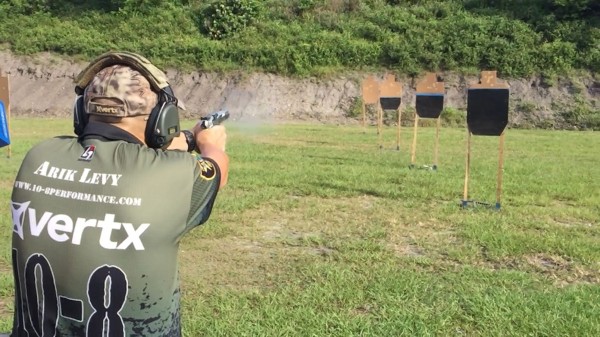Okay…what is he talking about….
Too often it has been my experience with law enforcement shooters (and competition too) that the need to pull the trigger “now” supersedes the requirement of hitting the target. It’s like a building pressure in the mind that shooters will settle for less than an acceptable sight picture and blast off a round..or two..or three. It’s almost as if a self gratifying sound and feeling overwhelms what the process should be.
We’ve all been there before. We are shooting a drill or a stage in a match. There is a long shot of 15 yards away and the sights are almost there (shoot now!). You start the process of pulling the trigger (shoot now!) and aiming the gun (shoot now!) when “boom”…we shoot “now”. Why did I miss? Following the fundamentals of shooting is tough. Shooters like to blow by the basics to get to that Advanced training. “I learned to shoot 20 years ago….” or something like that is heard in every class I teach. But the fundamentals ground us. It gives us purpose. See the target, line up the sight picture, press the trigger to the rear without disrupting the “acceptable” (what’s acceptable to you might be different than for me) sight picture. Do that and you will get your hits.
But why do we shoot “now”? It’s because we already have invested in the end result, the hole in the bullseye or the plate falling down. It’s hard to keep the mental focus necessary of watching the sights and the mind says “ENOUGH!” This is followed by a loud blast…
How do we get pass this? As I mentioned before, the fundamentals work to help us. At your next practice (live fire) or shooting class, let go of the desire to hit the target and give yourself the freedom to relax into the basics of shooting by lining up the sights and pressing that trigger.
You’ll be surprised at how much better you’ll shoot by simply enjoying the fundamentals.
Now..go out and shoot.




Don’t think I’ve ever heard my main shooting problem described any more perfectly.
But now that the truth’s been exposed, will I be able to act upon it, or will it be…
Boom!
Your post resonates. Well said my friend.
Good article Arik. Working on dot drills and ball and dummy drills made a big difference in my skill level. Simple, but important skills (essentials as Dave Spaulding calls them), made me faster and more accurate. Doing alot of that last year helped me make the jump from B to A in USPSA Production.
It seems to me uspsa type shooting tends to encourage such behavior ( a pretty good uspsa shooter I know say the uspsa guys say if you are shooting all a’s you are not shooting fast enough- like speed is more important than hits on target) I refuse to get sucked into that mentality. Any shooting game which doesn’t penalize heavily less than perfect shot placement needs fixing. In my mind limited round counts ( like coming to the line with 20 rounds to engage an 18 target scenario ) and making the uspsa target b zone a five or ten point penalty instead of the current one would work. In any shooting event it should be statistically impossible to shoot a bunch of c and d hits and have speed compensate for poor hits in a way that the guy throwing rounds out of the a zone can win a match
As a long time USPSA competitor, I must clarify the “if you are shooting all A’s” and the misconception of speed overcoming poor hits. Assuming competitors of similar skill levels, it is NOT possible to overcome a large quantity of C and D zone hits with speed. Without boring readers with the math, the penalties for dropped points become a significant hindrance, and shooting clean or with minimal dropped points (ie. one or two C zone hits and no D zones) is always preferable and superior to spraying it.
As far as extra rules for this or that, the great thing about USPSA over IDPA is that is specifically does not pile on a ton of arbitrary rules so that competitors can solve the artificial problem however they choose.
I have shot USPSA on and off since the 80’s, when it was just IPSC, and it has only served to help my performance in the LE firearms arena. I made A class in Open division with an M&P 9 and RMR optic, shooting Minor – which meant that I had to shoot all A’s to avoid severe penalties for C and D hits when scored Minor. You get out of USPSA what you choose. Don’t let misunderstandings of it keep you from going out and learning what you can really do.